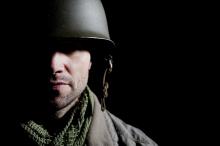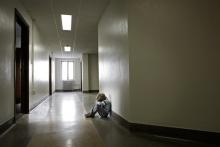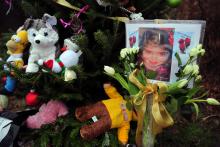trauma

AN IRAQ WAR VETERAN passes the offering plate after listening to a sermon on Christian persecution in the early church—tales of torture and execution. A 19-year-old student—home for the summer from college, where her first experience at a fraternity party turned violent—listens to her childhood pastor recite the story of David and Bathsheba and David’s subsequent path to redemption. A mother placates her two children with Cheerios and raisins as she struggles through the exhortations to spousal submission, hiding bruised arms under long sleeves in the middle of July.
The Christian story is littered with trauma—from slavery (the Israelites in Egypt) to sexual assault and abuse (Dinah, Tamar, Bathsheba) to the trauma of war (see: much of the Old Testament) to, of course, the crucifixion of Jesus and martyrdom of his disciples.
There is possibly no better resource for understanding the implications of and need for healing from trauma than faith communities pointing to the cross and Jesus’ answer to violence. Both the need and the opportunity are great. But perhaps too often Christians proclaim the message of Easter—victory and restoration—while skipping past the violence and trauma of Good Friday. Some theologies explain away that violence as a necessary component of ultimate salvation—but let’s get to the salvation part, okay?—leaving survivors of trauma who fill our Sunday pews without a touchstone for healing within the very communities that purport to be safe spaces.

An independent report commissioned by the American Psychological Association (APA) has found that the association secretly colluded with the Department of Defense and the CIA to weaken the APA’s ethical guidelines and allow psychologists to take part in government torture programs under the Bush administration post-9/11.

National Minority Mental Health Awareness month is upon us in the U.S., and never has the scope and impact of mental health issues threatened to affect the long-term security of our country and world than now.
This year, the UN Office for the Coordination of Humanitarian Affairs estimates that 10.8 million people are affected by the conflict in Syria, with 4 million refugees having fled the country. This is the largest refugee population coming out of any one conflict in over a generation. Similarly, in early 2015, UNHCR estimated that the total population of concern, due to the conflict in Iraq, exceeded 3 million people. Millions of people have experienced the unimaginable trauma of political and religious conflict and persecution in the Middle East, especially women, whom the Iraqi Ministry of Health determined were disproportionately affected by mental health illness due to the recent conflict. The scale and depth of the trauma demands a multi-faith, multi-sector, multi-discipline response, before it is too late.

Soldiers know on a deep moral level that in committing great harm to others, they have committed great harm to themselves. They don’t need our society to project our demons of war — our own moral injury — upon them as we point the finger of accusation against them. Soldiers have suffered enough moral injury. We need to take responsibility for our own.

MY GREAT-GRANDMOTHER, Elizabeth “Lizzie” Johnson, was born in 1890 in Camden, S.C., with a different last name from all the other people in her household. Three generations later, we have no idea where the name Johnson came from.
Lizzie grew up working plantation land owned by her grandmother, Lea Ballard. Lea received the land in the wake of the Civil War: We don’t know how or why, though one theory speculates that Lea, who was listed as a 42-year-old mulatto widow on the 1880 U.S. Census, may have been the daughter of her slave owner. He may have given the land to her after the Civil War. We don’t know. We only know that Lea owned it, that she had 17 children who worked that land, according to family lore, and that the city of Camden eventually stole the land from her by the power of eminent domain. This we know from records I hold in my possession.
Lizzie married a railroad man named Charles Jenkins. Lizzie and Charles had three children; Charles later died in a railroad accident. Lizzie had a choice: endure the brutality of the Jim Crow South alone with three kids, or move with the stream of black bodies migrating north. Lizzie migrated to Washington, D.C., and, eventually, to Philadelphia and took her lightest-skinned child with her.

At a church workshop last week, I set aside my carefully planned teaching and just let people talk.
It became clear that everyone had an old story they needed to tell. Until it was heard, no one in the room could or would move on to thinking about the future. And even when it was heard, half of them would keep cycling back to the old story.
I sensed that, for some, the old story contained an identity, in the sense of “this story is who I am.” I need to keep telling this story so that you know me. Until I am sure you’ve heard it, know me, and accept me, I can’t stop.
For some, the old story was the burden on their back, the cloud over their heads. This story explains why I fall short, seem hesitant or even paralyzed. If you know my story, maybe you can accept me and forgive me.
For some, the old story was the safe place, the known that kept the scary unknown at bay. As long as I keep telling this story and presenting the me that existed yesterday, I don’t have to contemplate the ways I am changing and the tomorrow that worries me.
It was like a case study in the long-ago classic, “I’m OK — You’re OK.” People wanted to know they were OK — acceptable and maybe someday even loved.
I think back to a recent lunch with the rector of the local Episcopal church, where I kept peeling the onion, telling her one thing about myself and then, if she accepted that, telling her something more. She was doing the same. If we know each other and still accept each other, then we can be in relationship.

Mint's life has been changed since working at NightLight. Having an economic alternative is an essential part of bringing liberation to women who have been trafficked or prostituted. The exit or rescue is only the beginning of freedom. At the same time, a job alone does not restore a woman to her true identity and humanity. There is a well of pain and trauma that lies beneath the surface.
Most organizations that provide after care for survivors struggle to support the financial burden of restoration. When the rescue is over, the support often dwindles before the woman is fully restored and ready to thrive on her own. Without intentional and holistic after care, victims who are rescued often find themselves vulnerable again. Left alone, the familiarity of their slavery can begin to look like the best option for survival.
A successful business can provide the wages and benefits needed to sustain a woman while giving her the opportunity to reach full restoration. When the greater community invests in freedom products, we can help vulnerable women reach their full potential.
For Mint’s sake and other women and girls, may it be so.

In recent years, my family has navigated some rough patches: death, cancer treatments, open heart surgeries, chronic disease, etc. Now, I’m certain this isn’t everyone’s experience, but mine has been that in these times of trauma or tragedy, family comes together to stand with one another as we wrestle through life’s crap. We aren’t picking fights, we are crying on each other’s shoulders.
In recent months, our human family has been enduring an especially rough patch.
War.
Racism.
Suicide.
Deadly viruses.
Plane crashes.
Whether in remote villages or urban centers, few have been untouched (in some way) by the realities unfolding.
As I observe our corporate response to tragedy as a human family, and evaluate my own response in the midst of it, I have noticed something disturbing unfold. Rather than rally together as a family navigating a season of trauma, we have used this moment to divide, stir hatred and misunderstanding, point fingers, and more than anything, view those on the opposite side of an issue as less than human.





Despite all the modern conveniences of the 21st century, our information-saturated culture, an exhaustive supply of self-help books, and giant advances in medical technology, doesn’t it seem like our society is more stressed, our anxiety higher, and more of our kids prescribed behavior modification drugs?
What if one of the reasons for our strung-out culture was the social, emotional, mental, and physiological outworking of the effects of poverty?
In the latest release of the Shriver Report, Dr. Nadine Burke Harris, founder of the California Pacific Medical Center’s Bayview Child Health Center, has found through medical research and experiences of her patients that the stress of poverty can be manifested in alarming behaviors and predispositions.

I wasn’t really expecting painful things to happen to me.
I knew that pain was a part of life, but — thanks in part to a peculiar blend of “God-has-a-plan” Southern roots, a suburban “Midwestern nice” upbringing, and a higher education in New England stoicism — I managed to skate by for quite some time without having to experience it.
After a handful of traumas in the last five years, things look different now. Trauma upends everything we took for granted, including things we didn’t know we took for granted. And many of these realities I wish I’d known when I first encountered them. So, while the work of life and healing continues, here are ten things I’ve learned about trauma along the way.

As we move into the Sundays following Christmas and begin to anticipate Epiphany, we face the terror of the coming week’s Gospel reading, the Massacre (or Slaughter) of the Innocents. While there are a number of stories in the Bible that are difficult to read/hear, Herod’s murdering the innocent children of Bethlehem in his attempt to kill a potential threat to his throne must be among the top.
Herod’s brutality is legendary. Most of what we know comes from the Jewish historian, Josephus. Matthew records that Herod became distraught when he learned from the Magi that an astrological sign had indicated the birth of a Judean King (2:1-8). When the Magi did not return to report the location of this newborn King, Herod realized that he been tricked and “he was infuriated, and he sent and killed the children in and around Bethlehem who were two years old or under” (2:16). While scholars debate whether this event is historical or not, it is certainly consistent with what we learn about Herod from Josephus.

Bio: Sister Jean Lait, CSF, is an Anglican Franciscan sister based in San Francisco who protests drones and their effects on children. communitystfrancis.org
1. Why did you decide to stand up against drones?
During WWII, I experienced the bombing of Coventry in England. As a child of 9 years, I slept under the stairs, anxiously waiting for the bombs to drop. Toward the end of the war, flying bombs known as “doodlebugs” were used. These were very similar to drones and were sent from Germany. They were aimed anywhere. These were bombs where you heard a whistle and then it was silent before the bang.
Thinking back on the fear and anxiety I experienced, the whole idea of drone warfare is just immoral to me. No child should ever be that frightened. No child should have to live in a war zone. That kind of trauma affects you, one way or another. You either use that experience for good or otherwise.

The plight of Job is one of the most familiar stories from the Hebrew Bible. Many of us know Job’s suffering and the tortuous advice of Job’s “comforters.” The experience of suffering is universal. In the midst of our suffering, we seek to understand, to process, to comprehend. For individuals of faith, events of radical suffering plunge us into a theological crisis. Where is God? Is God causing this to happen? Is God allowing this to happen? Why?
The crisis deepens when we realize that the suffering does not match our preconceptions of how the world should work. We seem to think that if we output positive vibes into the world, the world (or God) will reciprocate. That would be fair. That would be right. That would be just.
However, in the reality of human experience we recognize that great fortune sometimes falls on the underserving, while horrible events beat down the most innocent among us.
Perhaps this is why so many of us can relate to the book of Job. Here we have a character who does everything right. From the first verse, we know that Job is “blameless and upright, one who feared God and turned away from evil” (Job 1:1). In fact, these characteristics draw God’s attention and praise.

In the wake of the Boston Marathon bombings that left three dead and more than 260 injured, perhaps none face more significant adjustments or a longer road ahead than the 14 amputees who lost a limb.
For these victims, the path forward involves relearning almost everything, from getting out of bed to getting in a car. Whether they go on to lead satisfying lives depends largely on how they handle the spiritual challenges at hand, according to amputees and researchers.
Losing a limb is like losing a family member: It involves grief and mourning, according to Jack Richmond, a Chattanooga, Tenn., amputee who leads education efforts for the Manassas, Va.-based Amputee Coalition. When one’s body and abilities are radically changed, questions of meaning are suddenly urgent: Why did this happen? Why am I here?
“You’re wondering: Why did I live?” said Rose Bissonnette, an amputee and founder of the Lancaster, Mass.-based New England Amputee Association, a support organization for amputees.

Two days after the Boston Marathon bombings, Boston Medical Center chaplain Sister Maryanne Ruzzo was checking on staffers who’d been caring for the injured when she received a page. A bombing victim wanted to see her.
The bedside was fraught with worry. A woman in her 30s had lost a leg to amputation as surgeons deemed it unsalvageable. Still suffering multiple injuries, she was now heading into surgery again, knowing she might wake up with no legs at all.
Ruzzo stood among the woman’s parents and siblings and did what she does best: listen. She heard their fears, including concern for the woman’s husband, who was being treated at a different hospital and who also might lose a leg to amputation. Then she prayed.
“Other people might not want to feel the pain and say, ‘Oh, it’s going to be fine,’” said Ruzzo, the Archdiocese of Boston’s coordinator of Catholic services at BMC. “We just try to be present and listen to them. … I prayed for the surgeons and the nurses.”
In a week when Boston hospitals cared for more than 170 bomb victims, staff chaplains were suddenly in great demand. They moved calmly from emergency departments to waiting rooms and employee lounges, offering a compassionate ear and much-needed comfort to anxious patients, family members and staffers.

*If you have not read the Book of Job, this pastor recommends it as a must-read during this time of national crisis. There is much to digest; it requires no theological confession (only a sincere concern for humanity); and it reminds us of how little we know, how much we speak.*
The Book of Job provides a helpful but not fully welcome commentary on how we might read and understand the tragic shooting at Sandy Hook Elementary School. Because that’s what we want right? Understanding? Things happen and we want to know WHY, so as to file them in our Rolodex of infinite human wisdom. Except … Job could do nothing to prevent the tragedies that befell him, and as he sat in the silence of his grief – having just lost his 10 children, his possessions, and his health – all he had was his three friends who came to sit with him. Except … sitting was not enough for them. They had to talk. They had to explain WHY this happened to Job. And in the process they forgot about Job.
Tragedies are always the occasion for extraordinary public debate: New Orleans moved from the victims to the state of FEMA in 2005; Columbine rushed us from victims to gun control; and Darfur moved from victims to foreign policy, as does Israeli-Palestinian conversation today push us away from the exiles themselves. Newtown, Conn., is no different, where a major cable news outlet was waiting in the parking lot to talk to children (not care for children, but talk to them about what was going on inside, focusing on their eyes and ears, but not their hearts). As if a 6 year old can wax eloquent on the horror they’ve witnessed. Sensationally irresponsible: some of the worst journalistic ethics I’ve seen in … well … let’s not go there.